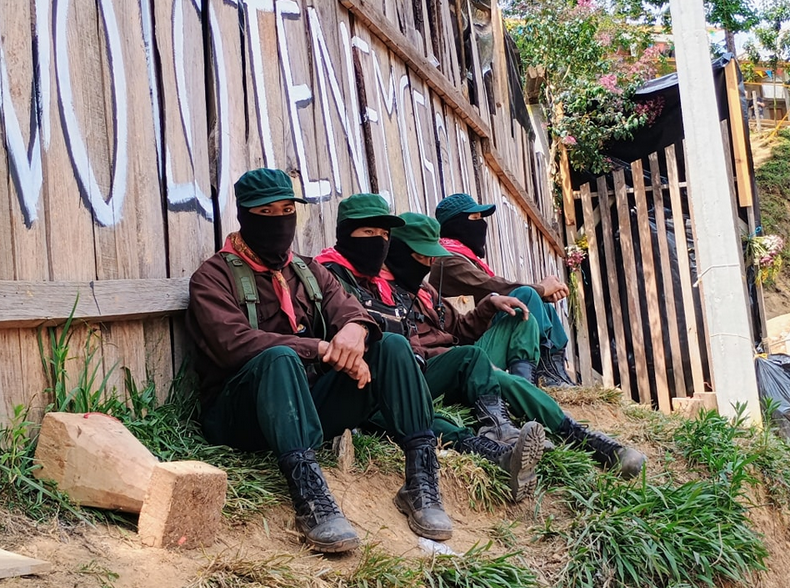
On Friday, April 24, in the community of San Pedro Cotzilnam, Chiapas, one of those operations that characterized the government of Felipe Calderón took place. Integrated by the National Guard, Mexican Army, Pakal Immediate Reaction Forces (FRIP), Ministerial Intelligence Investigation Agency, State Preventive Police, Secretariat of Security and Citizen Protection of the federal government. The operation included searches -without warrants- at different homes. The State forces violently raided homes of Zapatista Support Base families, causing destruction, stealing money and belongings from the communities, and taking José Baldemar Sántiz Sántiz and Andrés Manuel Sántiz Gómez into custody without arrest warrants.
Since his arrival to the government of Chiapas (2024), Eduardo Ramirez promised to “pacify” Chiapas by using the military support provided by his party colleague in the Presidency of the country, considerably increasing the security budget, deploying an intense media campaign and creating elite groups, such as the FRIP. But the signs of authoritarianism and abuse of power mark her cabinet. At the head of the Chiapas prosecutor’s office is Jorge Luis Llaven Abarca, who during his time as Secretary of Public Security and Citizen Protection in the government of Manuel Velasco Coello, was characterized by the excessive use of public force, repression, arbitrary detentions and torture. The detention and torture of members of the Other Campaign of San Sebastián Bachajón, and the death under torture of Luis Ignacio Lara Vidal in 2005, are cases for which he has been denounced.
Upon learning of the detention of José and Andrés, Zapatista autonomous authorities conducted their own investigation and reported the situation to the Fray Bartolomé de las Casas Human Rights Center. For 55 hours, José and Andrés remained disappeared. But social pressure began to have an effect and on February 27, the Facebook page of the Chiapas Prosecutor’s Office published: “For aggravated kidnapping, law enforcement officers apprehend three alleged perpetrators. For events that occurred in the municipality of Aldama. The State Attorney General’s Office, the Secretary of National Defense and the Secretary of People’s Security served arrest warrants against José N, Andrés N and Andrés Martín N, as alleged perpetrators of aggravated kidnapping, committed against a male person of undisclosed identity.” In addition to lying with the alleged arrest warrants, the intention to fabricate crimes was already evident.
But the Chiapas prosecutor’s office and government, as well as the federal government, which was aware of the situation at all times, do not seem to know that the Zapatistas do not surrender, do not sell out and do not betray. So while the State fabricated guilty parties and criminalized the detainees by trying to accuse them of kidnapping, the autonomous Zapatista authorities first proved the innocence of their support bases, and then went further: they discovered the perpetrators of the kidnapping and subsequent murder of Pedro Díaz Gómez, committed by non-Zapatistas. Making use of their security and justice systems, while still respecting human rights, the Zapatistas detained the criminals and took them into custody in one of the rebel communities. “The two criminals confessed to the kidnapping and murder against Pedro Díaz Gómez, and pointed out the precise place where they had buried the body. They indicated the complicity of other people,” narrates the subcomandante insurgente Moisés, spokesman for the EZLN. He continues: “All this was known to the government at all three levels, but nothing was done. Instead of immediately releasing our innocent comrades, they dragged their feet and proposed an exchange of detainees. That way they could bribe the media and sell them the story that it was all the merit of the state and federal justice system. And they could also keep what they stole from the poor indigenous people who had suffered their attack.”
“In an era in which justice is one more victim of money, corruption, force, impunity, arbitrariness and power, it is a real source of vital encouragement to find peoples who have given themselves a government with their own authorities who, based on fundamentally different principles, objectives, laws and procedures, have managed to successfully put into practice a system of justice with which they can resolve any conflict presented to them,” wrote researcher Paulina Fernández Christlieb in a book with the same title as this text. This alternative security and justice system built by the Zapatistas is not only a reference for justice in a country where more than 93 percent of crimes go unpunished. In addition, this system has helped them today to expose a State that continues to distance itself from justice.
Original text by Raúl Romero published in La Jornada on May 5th 2025.
Translated by Schools for Chiapas.